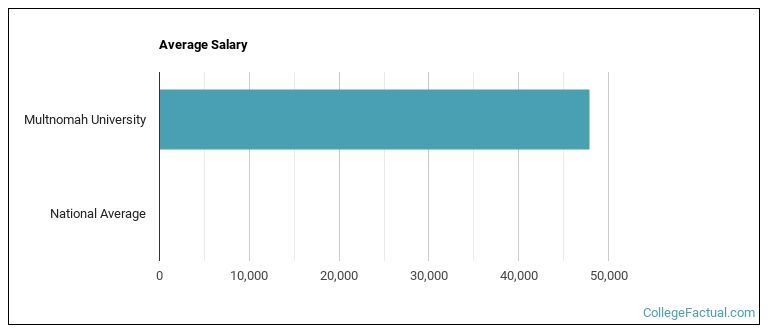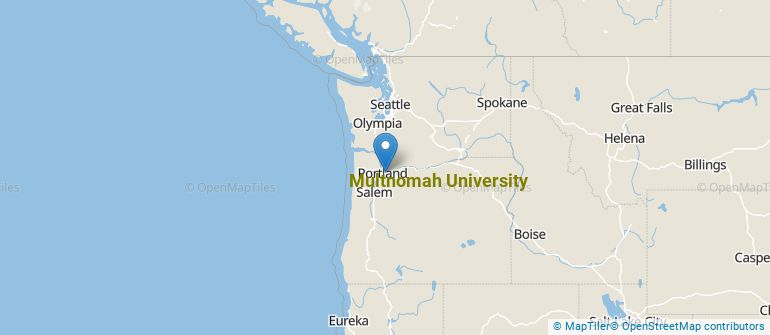 by our College Data Analytics Team
by our College Data Analytics TeamExplore the best ranked schools for the programs you are most interested in.
Multnomah University was not ranked in College Factual's 2025 Best Overall Colleges report. This could be for a number of reasons, including lack of data.
The acceptance rate at Multnomah University is a competitive 53%, so make sure you take your application seriously when putting it together. Even leaving out a minor detail could be a reason to move you to the rejection pile.
About 7% of students accepted to Multnomah University submitted their SAT scores. When looking at the 25th through the 75th percentile, SAT Evidence-Based Reading and Writing scores ranged between 480 and 610. Math scores were between 570 and 610.
The student to faculty ratio is often used to measure the number of teaching resources that a college or university offers its students. The national average for this metric is 15 to 1, but at Multnomah University it is much better at 12 to 1. That's good news for students who want to interact more on a personal level with their teachers.
Another measure that is often used to estimate how much access students will have to their professors is how many faculty members are full-time. The idea here is that part-time faculty tend to spend less time on campus, so they may not be as available to students as full-timers.
The full-time faculty percentage at Multnomah University is 32%. This is lower than the national average of 47%.
The freshmen retention rate is a sign of how many full-time students like a college or university well enough to come back for their sophomore year. At Multnomah University this rate is 53%, which is a bit lower than the national average of 68%.
When it comes to finishing their studies on time, those seeking a bachelor's degree from Multnomah University have a four-year graduation rate of 36%. This is comparable to the national average of 33.3%
Find out more about the retention and graduation rates at Multnomah University.
During the 2017-2018 academic year, there were 336 undergraduates at Multnomah University with 281 being full-time and 55 being part-time.
| $0-30 K | $30K-48K | $48-75 | $75-110K | $110K + |
|---|---|---|---|---|
| $27,441 | $25,798 | $25,925 | $31,717 | $28,572 |
The net price is calculated by adding tuition, room, board and other costs and subtracting financial aid.Note that the net price is typically less than the published for a school. For more information on the sticker price of Multnomah University, see our tuition and fees and room and board pages.
It's not uncommon for college students to take out loans to pay for school. In fact, almost 66% of students nationwide depend at least partially on loans. At Multnomah University, approximately 92% of students took out student loans averaging $6,202 a year. That adds up to $24,808 over four years for those students.

See which majors at Multnomah University make the most money.
Get more details about the location of Multnomah University.

Contact details for Multnomah University are given below.
| Contact Details | |
|---|---|
| Address: | 8435 Ne Glisan St, Portland, OR 97220 |
| Phone: | 503-255-0332 |
| Website: | https://www.multnomah.edu/ |
| Most Popular Majors | Bachelor’s Degrees | Average Salary of Graduates |
|---|---|---|
| Clinical, Counseling & Applied Psychology | 50 | NA |
| Biblical Studies | 38 | $33,182 |
| Theological & Ministerial Studies | 27 | NA |
| Business Administration & Management | 14 | NA |
| International Studies | 11 | NA |
| General Psychology | 11 | $25,964 |
| Theology & Religious Vocations (Other) | 11 | NA |
| Pastoral Counseling & Specialized Ministries | 9 | NA |
| General Biology | 8 | NA |
| Management Sciences & Quantitative Methods | 5 | NA |
Online learning is becoming popular at even the oldest colleges and universities in the United States. Not only are online classes great for returning adults with busy schedules, they are also frequented by a growing number of traditional students.
In 2022-2023, 273 students took at least one online class at Multnomah University. This is a decrease from the 291 students who took online classes the previous year.
| Year | Took at Least One Online Class | Took All Classes Online |
|---|---|---|
| 2022-2023 | 273 | 144 |
| 2021-2022 | 291 | 160 |
| 2020-2021 | 294 | 141 |
| 2018-2019 | 269 | 156 |
Footnotes
*The racial-ethnic minorities count is calculated by taking the total number of students and subtracting white students, international students, and students whose race/ethnicity was unknown. This number is then divided by the total number of students at the school to obtain the racial-ethnic minorities percentage.
References
More about our data sources and methodologies.